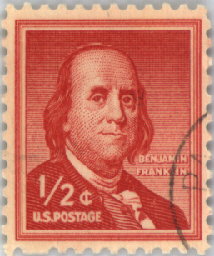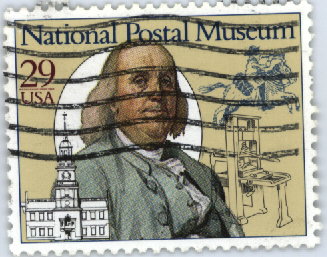Benjamin Franklin
 Benjamin Franklin, whom the Scottish philosopher David Hume
called America's "first great man of letters," embodied the
Enlightenment ideal of humane rationality. Practical yet
idealistic, hard-working and enormously successful, Franklin
recorded his early life in his famous Autobiography.
Writer,
printer, publisher, scientist, philanthropist, and diplomat, he
was the most famous and respected private figure of his time. He
was the first great self-made man in America, a poor democrat
born in an aristocratic age that his fine example helped to
liberalize.
Benjamin Franklin, whom the Scottish philosopher David Hume
called America's "first great man of letters," embodied the
Enlightenment ideal of humane rationality. Practical yet
idealistic, hard-working and enormously successful, Franklin
recorded his early life in his famous Autobiography.
Writer,
printer, publisher, scientist, philanthropist, and diplomat, he
was the most famous and respected private figure of his time. He
was the first great self-made man in America, a poor democrat
born in an aristocratic age that his fine example helped to
liberalize.
Franklin was a second-generation immigrant. His Puritan father, a chandler (candle-maker), came to Boston, Massachusetts, from England in 1683. In many ways Franklin's life illustrates the impact of the Enlightenment on a gifted individual. Self- educated but well-read in John Locke, Lord Shaftesbury, Joseph Addison, and other Enlightenment writers, Franklin learned from them to apply reason to his own life and to break with tradition -- in particular the old-fashioned Puritan tradition -- when it threatened to smother his ideals.
While a youth, Franklin taught himself languages, read widely, and practiced writing for the public. When he moved from Boston to Philadelphia, Pennsylvania, Franklin already had the kind of education associated with the upper classes. He also had the Puritan capacity for hard, careful work, constant self- scrutiny, and the desire to better himself. These qualities steadily propelled him to wealth, respectability, and honor. Never selfish, Franklin tried to help other ordinary people become successful by sharing his insights and initiating a characteristically American genre -- the self-help book.
 Franklin's Poor Richard's Almanack, begun in 1732 and
published for many years, made Franklin prosperous and well-known
throughout the colonies. In this annual book of useful
encouragement, advice, and factual information, amusing
characters such as old Father Abraham and Poor Richard exhort the
reader in pithy, memorable sayings. In "The Way to Wealth," which
originally appeared in the Almanack, Father Abraham, "a
plain
clean old Man, with white Locks," quotes Poor Richard at length.
"A Word to the Wise is enough," he says. "God helps them that
help themselves." "Early to Bed, and early to rise, makes a Man
healthy, wealthy, and wise." Poor Richard is a psychologist
("Industry pays Debts, while Despair encreaseth them"), and he
always counsels hard work ("Diligence is the Mother of Good
Luck"). Do not be lazy, he advises, for "One To-day is worth two
tomorrow." Sometimes he creates anecdotes to illustrate his
points: "A little Neglect may breed great Mischief....For want of
a Nail the Shoe was lost; for want of a Shoe the Horse was lost;
and for want of a Horse the Rider was lost, being overtaken and
slain by the Enemy, all for want of Care about a Horse-shoe
Nail." Franklin was a genius at compressing a moral point: "What
maintains one Vice, would bring up two Children." "A small leak
will sink a great Ship." "Fools make Feasts, and wise Men eat
them."
Franklin's Poor Richard's Almanack, begun in 1732 and
published for many years, made Franklin prosperous and well-known
throughout the colonies. In this annual book of useful
encouragement, advice, and factual information, amusing
characters such as old Father Abraham and Poor Richard exhort the
reader in pithy, memorable sayings. In "The Way to Wealth," which
originally appeared in the Almanack, Father Abraham, "a
plain
clean old Man, with white Locks," quotes Poor Richard at length.
"A Word to the Wise is enough," he says. "God helps them that
help themselves." "Early to Bed, and early to rise, makes a Man
healthy, wealthy, and wise." Poor Richard is a psychologist
("Industry pays Debts, while Despair encreaseth them"), and he
always counsels hard work ("Diligence is the Mother of Good
Luck"). Do not be lazy, he advises, for "One To-day is worth two
tomorrow." Sometimes he creates anecdotes to illustrate his
points: "A little Neglect may breed great Mischief....For want of
a Nail the Shoe was lost; for want of a Shoe the Horse was lost;
and for want of a Horse the Rider was lost, being overtaken and
slain by the Enemy, all for want of Care about a Horse-shoe
Nail." Franklin was a genius at compressing a moral point: "What
maintains one Vice, would bring up two Children." "A small leak
will sink a great Ship." "Fools make Feasts, and wise Men eat
them."
Franklin's Autobiography is, in part, another self-help book. Written to advise his son, it covers only the early years. The most famous section describes his scientific scheme of self- improvement. Franklin lists 13 virtues: temperance, silence, order, resolution, frugality, industry, sincerity, justice, moderation, cleanliness, tranquility, chastity, and humility. He elaborates on each with a maxim; for example, the temperance maxim is "Eat not to Dullness. Drink not to Elevation." A pragmatic scientist, Franklin put the idea of perfectibility to the test, using himself as the experimental subject.
To establish good habits, Franklin invented a reusable calendrical record book in which he worked on one virtue each week, recording each lapse with a black spot. His theory prefigures psychological behaviorism, while his systematic method of notation anticipates modern behavior modification. The project of self-improvement blends the Enlightenment belief in perfectibility with the Puritan habit of moral self-scrutiny.
Franklin saw early that writing could best advance his ideas, and he therefore deliberately perfected his supple prose style, not as an end in itself but as a tool. "Write with the learned. Pronounce with the vulgar," he advised. A scientist, he followed the Royal (scientific) Society's 1667 advice to use "a close, naked, natural way of speaking; positive expressions, clear senses, a native easiness, bringing all things as near the mathematical plainness as they can."
Despite his prosperity and fame, Franklin never lost his democratic sensibility, and he was an important figure at the 1787 convention at which the U.S. Constitution was drafted. In his later years, he was president of an antislavery association. One of his last efforts was to promote universal public education.
